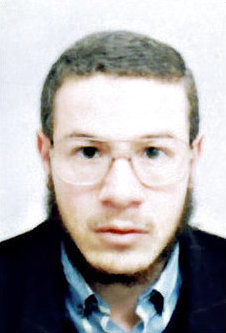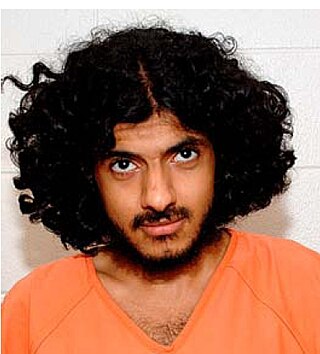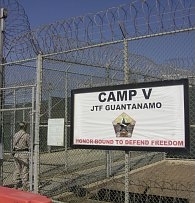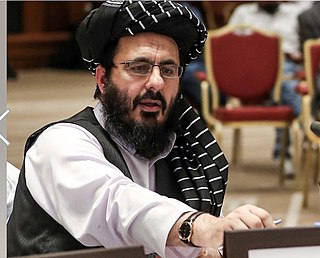
Camp Iguana is a small compound in the detention camp complex on the US Naval base at Guantánamo Bay, Cuba. Camp Iguana originally held three child detainees, who camp spokesmen then claimed were the only detainees under age 16. It was closed in the winter of 2004 when the three were sent back to their native countries.

Sabir Mahfouz Lahmar is a Bosnian citizen, who won his habeas corpus petition in United States federal court after being held for eight years and eight months in the military Guantanamo Bay detainment camps, in Cuba.
Muhibullah or Moheb Ullah Borekzai is a citizen of Afghanistan who was held in extrajudicial detention in the United States' Guantanamo Bay detention camps, in Cuba. His Guantanamo Internment Serial Number was 546. American intelligence analysts estimate that Muhibullah was born in 1982, in Shah Wali Koot, Afghanistan.
Extrajudicial prisoners of the United States, in the context of the early twenty-first century War on Terrorism, refers to foreign nationals the United States detains outside of the legal process required within United States legal jurisdiction. In this context, the U.S. government is maintaining torture centers, called black sites, operated by both known and secret intelligence agencies. Such black sites were later confirmed by reports from journalists, investigations, and from men who had been imprisoned and tortured there, and later released after being tortured until the CIA was comfortable they had done nothing wrong, and had nothing to hide.

Hassan Muhammad Salih bin Attash is a citizen of Saudi Arabia, held by the United States in the Guantanamo Bay detention camp in Cuba. Joint Task Force Guantanamo counter-terrorism analysts estimate that bin Attash was born in 1985, in Jeddah, Saudi Arabia.

The Guantanamo Bay detention camp is a United States military prison within the Guantanamo Bay Naval Base, also referred to as Gitmo, on the coast of Guantánamo Bay in Cuba. As of May 2024, of the 779 people detained there since January 2002 when the military prison first opened after the September 11 attacks, 740 had been transferred elsewhere, 30 remained there, and nine had died while in custody.
Abd al Razaq Abdallah Hamid Ibrahim al Sharikh is a citizen of Saudi Arabia who was held in extrajudicial detention in the United States Guantanamo Bay detainment camps, in Cuba.

Mohammed Ahmad Said Al Edah is a citizen of Yemen who was held in the United States' Guantanamo Bay detainment camps, in Cuba, for fourteen and a half years. His Internment Serial Number is 33. Joint Task Force Guantanamo counter-terrorism analysts estimate he was born in 1962, in Hay al-Turbawi Ta'iz, Yemen.

Mawlawi Mohammad Nabi Omari is an Afghan politician serving as First Deputy Minister for Interior Affairs under the Taliban since 6 October 2022. He was also appointed Acting Governor of Khost Province in late August 2021. Omari was held for nearly twelve years in extrajudicial detention in the United States Guantanamo Bay detainment camps, in Cuba. His Guantanamo Internment Serial Number was 832. American intelligence analysts estimate that he was born in 1968, in Khowst, Afghanistan. He arrived at the Guantanamo detention camps on October 28, 2002.
Abd al-Salam al-Hilah is a citizen of Yemen, held in extrajudicial detention in the United States Guantanamo Bay detainment camps, in Cuba.

Moath Hamza Ahmed al-Alwi is a citizen of Yemen, held in extrajudicial detention in the United States Guantanamo Bay detainment camps, in Cuba. His detainee ID number is 28. Guantanamo analysts estimated he was born in 1977, in Al Hudaydah, Yemen.
In United States law, habeas corpus is a recourse challenging the reasons or conditions of a person's detention under color of law. The Guantanamo Bay detention camp is a United States military prison located within Guantanamo Bay Naval Base. A persistent standard of indefinite detention without trial and incidents of torture led the operations of the Guantanamo Bay detention camp to be challenged internationally as an affront to international human rights, and challenged domestically as a violation of the Due Process Clause of the Fifth and Fourteenth amendments of the United States Constitution, including the right of petition for habeas corpus. On 19 February 2002, Guantanamo detainees petitioned in federal court for a writ of habeas corpus to review the legality of their detention.
The United States Department of Defense acknowledges holding five Turkish captives in Guantanamo. A total of 778 captives have been held in extrajudicial detention in the Guantanamo Bay detention camps, in Cuba since the camps opened on January 11, 2002, The camp population peaked in 2004 at approximately 660. Only nineteen new captives, all "high value detainees" have been transferred there since the United States Supreme Court's ruling in Rasul v. Bush. As of July 2012 the camp population stands at 168.
On January 16, 2010, the United States Department of Defense complied with a court order and made public a heavily redacted list of the detainees held in the Bagram Theater Internment Facility. Detainees were initially held in primitive, temporary quarters, in what was originally called the Bagram Collection Point, from late 2001. Detainees were later moved to an indoor detention center until late 2009, when newly constructed facilities were opened.
The Center for the Study of Human Rights in the Americas was a university human rights center located at the University of California, Davis. The CSHRA was housed within UC Davis' Hemispheric Institute on the Americas. Founded in 2005 and in operation until at least 2013, its website states that it was an "academic initiative for the comprehensive study of human rights across the American continent". The CSHRA operated two main programs, The Guantánamo Testimonials Project, which collected from public sources the testimonials of those involved in the Guantanamo Bay detention camp, ranging from prisoners to guards, FBI agents, military psychologists, etc., and the Neurobiology of Psychological Torture project, which investigated the neurobiology of psychological torture, including at Guantanamo Bay.





